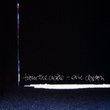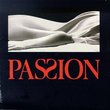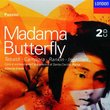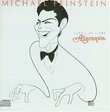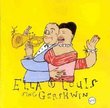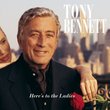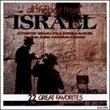| All Artists: Gioachino Rossini, Edoardo Müller, Orchestra e Coro dell'Accademia Nazionale de Santa Cecilia, Joyce DiDonato Title: Colbran, the Muse Members Wishing: 0 Total Copies: 0 Label: Virgin Classics Original Release Date: 1/1/2009 Re-Release Date: 10/6/2009 Album Type: Enhanced Genres: Special Interest, Classical Style: Opera & Classical Vocal Number of Discs: 1 SwapaCD Credits: 1 UPC: 5099969457906 |
Search - Gioachino Rossini, Edoardo Müller, Orchestra e Coro dell'Accademia Nazionale de Santa Cecilia :: Colbran, the Muse
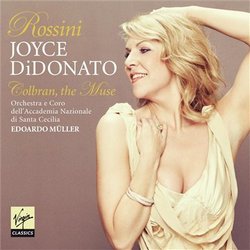 | Gioachino Rossini, Edoardo Müller, Orchestra e Coro dell'Accademia Nazionale de Santa Cecilia Colbran, the Muse Genres: Special Interest, Classical
Following her first, dazzling recital for Virgin Classics, Furore -- Arias by Handel, Joyce DiDonato turns to the composer whose heroines first brought her to international stardom: Gioacchino Rossini. "Is Joyce DiDonato t... more » |
Larger Image |
CD DetailsSynopsis
Album Description Following her first, dazzling recital for Virgin Classics, Furore -- Arias by Handel, Joyce DiDonato turns to the composer whose heroines first brought her to international stardom: Gioacchino Rossini. "Is Joyce DiDonato the world's best Rossini singer?", asked the New York magazine Opera News after the American mezzo sang the finale of La Cenerentola at Carnegie Hall in January 2009. "That title certainly seemed hers by sovereign right," it continued; "Her phrasing was silky, her timbre rich and glowing, and her ornaments were impeccably stylish and utterly beguiling. Most impressive was DiDonato's combination of immaculate technical control with an air of wild, unstoppable joy. This was truly a moment to treasure from an artist who is at the very top of her game." "To make a recording of Rossini arias is a true dream for me," says Joyce DiDonato. "His works have been hugely responsible for giving me the opportunity to break into this crazy opera world, and they have given me such incredible joy on the stage. I wanted to take this wonderful opportunity to show the wide, surprising range of his compositions. He was incredibly inspired by his wife, Isabella Colbran, the reigning, supreme diva of her day. To explore some of the nine roles he wrote for her, will afford wonderful insight into how a composer is inspired by a particular muse and hear how Isabella ignited incredibly creative forces in him. She was widely hailed in her relatively short career for her incredible range -- not only vocal, but dramatic, too -- and that will be evident here as we explore the heartbreaking pathos of Desdemona, the hopeful triumph of Semiramide, and the unleashed power of Armida." Similarly Requested CDs
|
CD ReviewsColbran the Muse - DiDonato the Goddess! G P Padillo | Portland, ME United States | 10/10/2009 (5 out of 5 stars) "Fierce is just about the only word I can come up with so bowled over have I been by listening to this new disc from Madama DiDonato. It opens like gangbusters with the spectacular rondo "D'amore al dolce impero" from Armida - a very impressive way to open this recital, every minute of which is thrillingly AND gorgeously sung. DiDonato hurls her voice through coloratura that will practically make your head spin - showing off a more dazzling range than one usually encounters in a mezzo. Then again, she seems to be almost channeling Colbran. The Dona del lago selections remind me of another mezzo I loved in this music, the young von Stade, with DiDonato possibly earning the laurel wreath here. Of course 35 years ago when Flicka was singing this music Rossini scholarship and performance standards were not quite what they are now, and she was singing it live (in Dallas) with an opera house orchestra in that old barn and recorded by pirates. In 2009 Ms. DiDonato has it considerably better - but none of that would matter if she couldn't sing this stuff and sing it she does - most impressively - and with high notes, grupetti, wild and fierce (there's that word again) variations that pose not a single problem. Her upward scale work in the finale is just nuts! Putting away the fireworks for a minute, DiDonato summons up ravishing tone and pours her heart into Maometto II's "Giusto ciel in tal periglio" - I've heard many versions of this aria, and DiDonato virtually matches the tragic pathos that Sills brought to this in her La Scala debut, and with a similar quality that's both sunny and sad. The entrance of the chorus - then her decorated line is gorgeous (and I didn't even miss the impossible high note (D#?) Sills tacks in that makes me swoon). I DO miss that Maometto doesn't include the gorgeous cabaletta that follows (which Sills is ridiculously great in). It's fun to hear the "e cento trappole prima di cedere" music from "Una voca poca fa" pop up in the middle of Elisabetta regina d'Inghilterra's "Quanto è grato all'alma mia" (or was it vice versa?) and Joyce and Co. make it soar. It's also great to hear a nice chunk of Otello (aided beautifully by Lawrence Brownlee) making me wish this opera were more popular than it ever got to become (thanks a lot, Verdi!). I'm thinking SOMEONE needs to mount a production of this for these two. Talk about a hit! Eduardo Muller leads the Accademia Nazionale di Santa Cecilia forces in glorious, full blooded readings the orchestra playing as if to the manner born and the choristers, clearly inspired sing with the same infectious love for Rossini as their golden tressed collaborator. I won't go into detail of every number here (you're welcome!) but the entire disc is so well conceived, so lovingly put together, the singer's phrasing, breath control and sense of drama is all so damned exciting it moves right to the top of this year's "favorites" pile!" Another Great DiDonato Release Kyle E. Lockhart | Texas USA | 10/07/2009 (5 out of 5 stars) "I was very pleased to see that DiDonato was releasing a disc of all Rossini material. Even though there are plenty of of mezzo Rossini recital discs in the catalog, I was confident that this would be a great addition. After receiving the disc and listening to it three or four times I was compelled to write a quick review noting the high quality of singing on this recording. I have heard these arias and scenes sung by a wide range of singers but DiDonato's treatments are truly unique, beautiful, very tasteful. I don't need to go into the details of each track because they are all worth hearing. If you aren't already familiar with DiDonato, this would be a great introduction as it displays her wide range and flawless tone." Superb, exiting and beautiful singing - perfection! D. H Patterson | Houston, TX United States | 10/08/2009 (5 out of 5 stars) "It's been a long, long time since the release of an opera recital made me this happy. Okay, I'm old and jaded and easily given to the "You should have heard Sutherland (or Horne or Callas or whomever)" kind of complaint. But I have no qualms at all in placing this recital among the best I've ever heard. I've enjoyed Miss DiDonato both live and on video, where her beauty and personality count for so much. Here, relying primarily on her voice and musicianship, she triumphs. Make no mistake, there's plenty of personality present on this disc, but her singing is the glory of it. The trills, runs, cadenzas and other coloratura feats are not merely managed, they are thrilling, delightful and amazing, all those things that real coloratura singing should be. She is alive to words in a way which many "bel canto" singers simply are not, and invested in the meaning of every aria. This is beautiful and exciting singing.
The sound is superb, the conducting, playing and choral singing are dandy. I'll go out on a limb and say this has become a desert island disc for me. DiDonato's version of the killing ARMIDA variations is simply the best I've ever heard, and she is splendid in the blazing finale of that opera too. (The Met should take note!) This singer is clearly the best Rossini mezzo since Horne (and I'm well aware of the competition). Prepare to be dazzled." |

 Track Listings (16) - Disc #1
Track Listings (16) - Disc #1